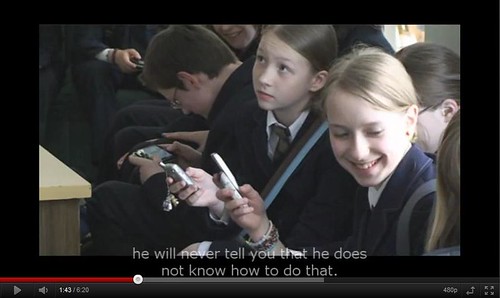Teachers Use Cell Phones in the Classroom
By Jason Koebler
You won't find Willyn Webb telling her high school students to put away their cell phones, even though they are technically banned in her Colorado district. She's been using cell phones to augment her lessons at Delta County Opportunity School for years.
It all started when she forgot a stopwatch to time a student's speech, and another student whipped out a cell phone and used its built-in timer.
From there, Webb kept finding new uses for basic text-enabled cell phones. She now uses phones to poll students in class and send homework reminder text messages to students and parents. Students also use a Google text-messaging service that allows them to look up a variety of facts. After seeing how engaged Webb's students are, the school's principal has decided to look the other way.
Halfway across the country, Lisa Nielsen was defying a cell phone ban Mayor Michael Bloomberg placed on New York City schools. As far back as 2008, she was encouraging teachers to reach students via text, and to allow students to use text messaging services to define words and look up facts and figures. She has since taken a post in the office of educational technology for New York City's Department of Education.
Nielsen and Webb eventually connected via E-mails and text messages and coauthored a book of lesson plans called Teaching Generation Text: Using Cell Phones to Enhance Learning.
"We think school should be preparing students for real life--and in real life, people use cell phones," says Nielsen, who authors the blog The Innovative Educator. "If you're making an artificial world inside the school, you're not preparing them for the real world."
New York City's cell phone ban persists--a spokesman for Bloomberg told the New York Daily Newsin July that the devices have no place in schools. "Mobile devices are major distractions that prevent all the other students in the classroom from learning," the spokesman said.
Education author and blogger Will Richardson writes, however, that cell phone bans can have detrimental effects on students.
"First, it teaches them that they don't deserve to be empowered with technology the same way adults are. Second, that the tools that adults use all the time in their everyday lives to communicate are not relevant to their own communication needs. [And] third, that they can't be trusted (or taught, for that matter) to use phones appropriately in school," he writes.
Nielsen says using cell phones in the classroom makes sense, especially in schools that don't have the latest-and-greatest technology. Most students have a text messaging-enabled cell phone, she says, and if they don't have one, they can easily share. An April 2010 study by Pew Research Center found that 75 percent of 12-to-17-year-olds own a cell phone.
"Cell phones are the most ubiquitous device in American households today," Nielsen says. "I work with teachers and students who would much rather use their phone than a computer--they've got instant access to the world; it doesn't have to boot up."
Cell phones' multiple features make them more cost-effective than many classroom gadgets, she says. Cell phone programs such as Poll Everywhere, which lets teachers poll up to 40 students for free, completely replaces expensive student response polling systems, which Nielsen says are "kind of a pain to learn to use."
She adds, "No one has to learn to use their own phones. Even if I had millions of dollars to waste, it's better for students to use the phones they already own."
Both Webb and Nielsen say that encouraging students to use cell phones turns the phones into educational tools, not distractions or cheating devices.
"You start managing the cell phone use, teaching them cell phone etiquette," Webb says. Instead of trying to hide their phones all the time, her students use them for class. "It takes the cat and mouse game out of it."
Webb suggests skeptical teachers and administrators start by encouraging students to use cell phones outside the classroom for homework. She recommends a free, text-based service called ChaCha, where people are paid to quickly search and answer students' questions.
She's even found administrative uses for cell phones, which now help her school save money that it used to spend on printing take-home flyers.
"We don't have a secretary calling every student who is absent; we just do it through text messaging," she says. "There's no more mailing about back-to-school night. We're saving money in paper expenses and stamps, and we're getting immediate responses."
http://news.yahoo.com/teachers-cell-phones-classroom-143309621.html

 free iphone app
free iphone app
No comments:
Post a Comment